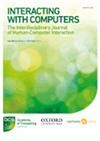教授不必只是一张漂亮的脸:教员名录如何通过直接提供语义信息来减少偏见的机会并更好地支持用户
IF 1.3
4区 计算机科学
Q3 COMPUTER SCIENCE, CYBERNETICS
引用次数: 0
摘要
大学单位的网站提供教师(教学人员)名单,以支持用户的各种任务,包括创建合作关系以及学生对项目和课程的选择。然而,这些名单通常只提供有关教师的浅层特征,如照片和姓名,而不提供专业知识、兴趣或成就等语义属性。未来的学生、教师、家长、捐赠者和社区居民往往无法直接获取这些语义属性,有时甚至需要进行大量搜索。如果网站只提供照片和姓名,那么用户只能根据姓名和外貌(包括种族、衣着和吸引力)进行选择(或选择进一步探索的对象)。本文认为,应方便用户获取正确的信息,并对面向公众的信息拥有自主权。我们记录了这一问题在世界各地的大学中普遍存在(n = 275)。我们提出了降低不那么相关的信息的显著性以总结教职员工的良好做法。为此,我们提高了相关信息(包括自我报告的研究兴趣和成就)的显著性和可访问性。我们提供了示例模板,以支持适用于类似组织列表的更多语义选择。这种方法也可应用于其他专业人员,如医生和律师。本文章由计算机程序翻译,如有差异,请以英文原文为准。
Professors Need Not Be Just a Pretty Face: How Faculty Directories Can Decrease the Opportunity for Bias and Better Support Users by Directly Providing Semantic Information
Websites for university units provide lists of faculty (teaching staff) to support a variety of users’ tasks including creating collaborations and student choice for projects and courses. However, these lists often only provide shallow features about the faculty such as pictures and names and not the semantic attributes of expertise, interest, or accomplishments. Prospective students, faculty, parents, donors, and those in the community often cannot directly access these semantic attributes and sometimes not without extensive search. Not having scholarship-focused individual entries leaves the selection process more open for implicit and explicit biases to be applied when searching for areas of expertise—if the website is face-focused (only pictures and names are provided), users can only choose (or choose who to explore further) based solely on name and physical appearance, thus including race, clothing and attractiveness. This paper argues for ease of access to the right information and self-authorship of the public-facing information. We document that this problem is pervasive at universities across the world (n = 275). We suggest good practices for decreasing the prominence of less relevant information to summarize faculty. This is accomplished by increasing the prominence and accessibility of more relevant information, including self-reported research interests and accomplishments. We provide example templates to support more semantic choices that would be applicable to similar organizational lists. This approach could be applied to other sets of professionals, such as doctors and lawyers.
求助全文
通过发布文献求助,成功后即可免费获取论文全文。
去求助
来源期刊

Interacting with Computers
工程技术-计算机:控制论
CiteScore
2.70
自引率
0.00%
发文量
12
审稿时长
>12 weeks
期刊介绍:
Interacting with Computers: The Interdisciplinary Journal of Human-Computer Interaction, is an official publication of BCS, The Chartered Institute for IT and the Interaction Specialist Group .
Interacting with Computers (IwC) was launched in 1987 by interaction to provide access to the results of research in the field of Human-Computer Interaction (HCI) - an increasingly crucial discipline within the Computer, Information, and Design Sciences. Now one of the most highly rated journals in the field, IwC has a strong and growing Impact Factor, and a high ranking and excellent indices (h-index, SNIP, SJR).
 求助内容:
求助内容: 应助结果提醒方式:
应助结果提醒方式:


